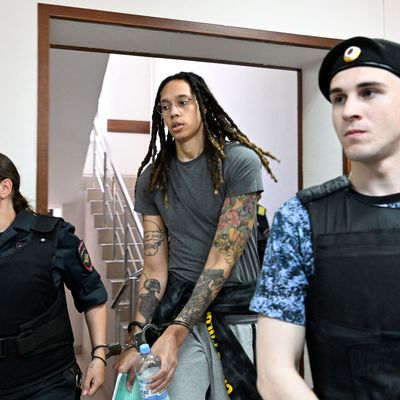
U.S. basketball star Brittney Griner appeared in court Monday in a Moscow suburb with cuffs on her wrists. At the pretrial hearing, a judge ordered her to remain in custody for the duration of her criminal trial for allegedly possessing vape cartridges containing hashish oil in her luggage in February. On Monday, Griner’s detention was again extended, this time for an additional six months.
The trial is scheduled to start Friday; if convicted on the charge of large-scale transportation of drugs, she could face up to ten years in prison. Griner, a seven-time WNBA All-Star whose salary is a quarter of the NBA rookie minimum, was playing in a Russian league to supplement her income during the off-season. As the Associated Press notes, fewer than one percent of defendants in Russian criminal cases are acquitted.
Although Griner’s family did not want to attract attention to her case toward the beginning of her detention, the State Department announced last month that she had been “wrongfully detained,” opening the possibility of release through negotiations with Russia. Her case is now being overseen by the Office of the Special Envoy for Hostage Affairs. Earlier this month, the U.S. embassy in Russia failed to patch through a call from Griner to her wife on their anniversary because the call came in on a weekend, botching the couple’s first chance to speak in four months.
Media in the United States and Russia have speculated over potential prisoner swaps that could bring Griner home after more than four months in Russian jail. But attorney Maria Yarmush — an expert in foreign citizens’ ordeals in Russian courts — told the Kremlin-funded channel RT that any such deal would require Griner to be convicted and sentenced and to apply for a presidential pardon. On Sunday, Secretary of State Antony Blinken said he had “no higher priority than making sure that Americans who are being illegally detained in one way or another around the world come home” without providing details on Griner’s case.






























